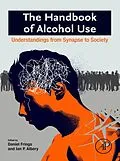Alcohol use is complex and multifaceted. Our understanding must be also. Alcohol use, both problematic and not, can be understood at many levels - from basic biological systems through to global public health interventions. To provide the multi-level perspective needed to address this complexity, the Handbook of Alcohol Use draws together an eclectic set of authors, including both researchers and practitioners, to examine the causes, processes and effects of alcohol consumption. Specifically, this book approaches the topic from biological, individual cognition, small group/systems, and domestic/global population perspectives. Each examines alcohol use differently and each offers its own ways to combat problematic behavior. While these alternative viewpoints are sometimes construed as incompatible or antagonistic, the current volume also explores how they can be complimentary.In summary, the Handbook of Alcohol Use brings together an international group of experts to explore how alcohol use can be understood from various perspectives and how these conceptualizations relate. In doing so, it allows us to understand alcohol consumption, and our responses to it, more from an account which spans 'from synapse to society'. - Explores alcohol use from individual through to societal levels - Synthesizes these varied levels of analysis on alcohol use - Draws on an international team of experts including researchers and alcohol treatment practitioners - Makes clear the implications of research for practice (and vice versa)
Autorentext
Daniel Frings is Professor of Social Psychology at London South Bank University. He is a widely published and cited author, with work including academic journal articles, various book chapters, a popular press psychology book, and a concise overview of social psychology aimed at students. His research focuses primarily on social identity processes, with a special interest in addiction. He also has research interests in the fields of mental health and psychophysiology and consults on the design and evaluation of digital mental health products. He is currently Chair of London South Bank University Ethics Panel, directs an MSc in Addictive Psychology and Counselling and is an Associate Editor of the Journal of Applied Social Psychology (Wiley).
Inhalt
Section 1 Positioning alcohol use and misuse
1. Contemplating the micro and macro of alcohol use and misuse to enable meta-understandings 3 Ian P. Albery and Daniel Frings
2. The world's favorite drug: What we have learned about alcohol from over 500,000 respondents to the Global Drug Survey 17 Emma L. Davies, Cheneal Puljevic, Dean Connolly, Ahnjili Zhuparris, Jason A. Ferris and Adam R. Winstock
3. Transparency and replication in alcohol research 49 Katie Drax and Marcus R. Munafo
Section 2 Within the body and mind
4. Alcohol and mental health: Co-occurring alcohol use and mental health disorders 79 Raffaella Margherita Milani and Luisa Perrino
5. The pharmacological understandings of alcohol use and misuse 107 Abigail Rose and Andrew Jones
6. Learning from the dead: How death provides insights into alcohol-related harm 141 Shane Darke
Section 3 The individual
7. Levels of cognitive understanding: Reflective and impulsive cognition in alcohol use and misuse 157 Dinkar Sharma and James Cane
8. Social cognition in severe alcohol use disorder 175 Fabien D'Hondt, Benjamin Rolland and Pierre Maurage
9. Metacognitive therapy for Alcohol Use Disorder: Theoretical foundations and treatment principles 201 Giovanni Mansueto, Gabriele Caselli and Marcantonio M. Spada
10. Promoting problem recognition amongst harmful drinkers: A conceptual model for problem framing factors 221 James Morris, Ian P. Albery, Antony C. Moss and Nick Heather
11. A psychological-systems goal-theory model of alcohol consumption and treatment 237 W. Miles Cox and Eric Klinger
12. Alcohol consumption in context: The effect of psych-socio-environmental drivers 261 Rebecca Monk and Derek Heim
Section 4 The group
13. I can keep up with the best: The role of social norms in alcohol consumption and their use in interventions 285 Sandra Kuntsche, Robin Room and Emmanuel Kuntsche
14. Alcohol consumption and group decision making 303 Hirotaka Imada, Tim Hopthrow and Dominic Abrams
15. An identity-based explanatory framework for alcohol use and misuse 329 Daniel Frings and Ian P. Albery
Section 5 Cultural questions
16. Alcohol consumption and cultural systems: Global similarities and differences 355 Miyuki Fukushima Tedor
17. Alcohol and the legal system: Effects of alcohol on eyewitness testimony 379 Julie Gawrylowicz and Georgina Bartlett
18. Spiritual and religious influences 399 Paramabandhu Groves
19. Alcohol use in adolescence across U.S. race/ethnicity: Considering cultural factors in prevention and interventions 419 Leah M. Bouchard, Sunny H. Shin and Karen G. Chartier
20. Alcohol use and misuse: Perspectives from seldom heard voices 453 Tran H. Le, Anthony M. Foster, Phoenix R. Crane and Amelia E. Talley
Section 6 Taking it into practice
21. Theory-driven interventions: How social cognition can help 485 Kristen P. Lindgren, Angelo M. DiBello, Kirsten P. Peterson and Clayton Neighbors
22. Taking social identity into practice 511 Genevieve A. Dingle, Isabella Ingram, Catherine Haslam and Peter J. Kelly
23. Working together: Opportunities and barriers to evidence-based practice 531 Jan Larkin and Daniel Donkor
24. Transdermal alcohol monitors: Research, applications, and future directions 551 Catharine E. Fairbairn and Dahyeon Kang
25. Recovery from addiction: A synthesis of perspectives from behavioral economics, psychology, and decision modeling 563 Amber Copeland, Tom Stafford and Matt Field
Section 7 Future directions
26. Alcohol addiction: A disorder of self-regulation but not a disease of the brain 583 Nick Heather
